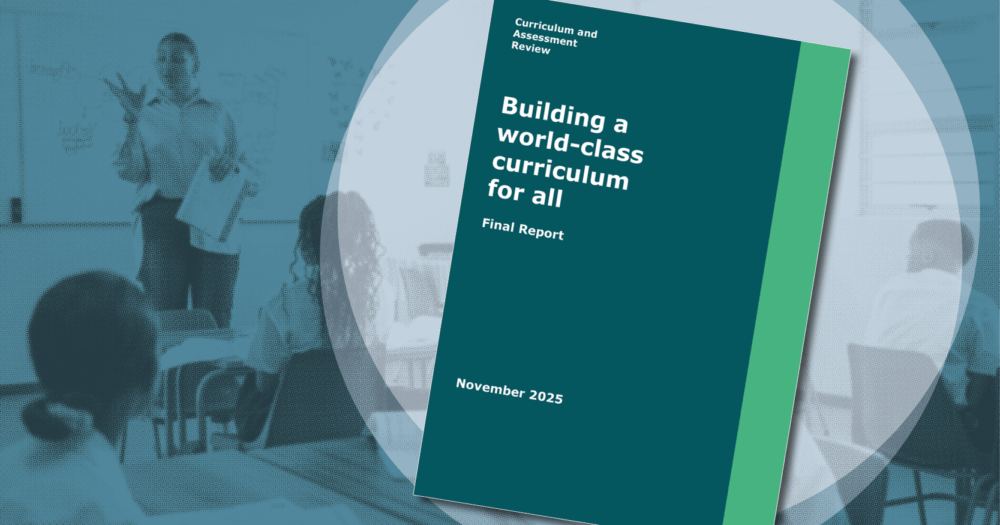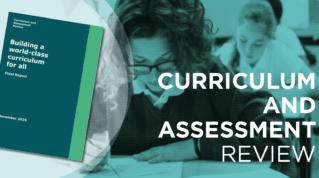The government will introduce a new national curriculum from 2028, scrap the EBacc league table measure, make citizenship compulsory in primary schools and force all secondaries to offer triple science GCSE.
In its initial response to the curriculum and assessment review, ministers also announced plans to strengthen writing assessment in year 6 and explore a new language qualification which “motivates pupils to want to continue studying”, to complement existing GCSEs and A-levels.
The curriculum and assessment review is due to be published Wednesday morning. But details of the main proposals, and the government’s response to some of them, have been shared in advance.
The review has recommended that the government review and update all programmes of study in the national curriculum. In some subjects it has recommended small tweaks. In others, such as English language, it has proposed a complete overhaul.
Update: You can now view the curriculum review in full here.
Our full curriculum review coverage:
News story: New national curriculum pledged from 2028
What ministers said: Which recommendations will now become government policy?
Key policies round-up: Scrap EBacc, year 8 tests in English and maths, cut 10% from GCSE exam time
Subject-specific policy round-up: Mandatory citizenship, RE in the national curriculum and triple science entitlement:
Interview: Becky Francis on the big ideas in her curriculum review
Schools to get four terms to prepare
The government has so far only accepted a handful of the recommendations, and despite repeated requests did not make its full response available at the same time as the review report.
Ministers said today they would introduce compulsory citizenship teaching at primary school, a triple science guarantee at GCSE and can the EBacc, which is blamed for discouraging pupils from studying creative and vocational qualifications.
But the government appears to have diverged from the review in a promise to “reform” the progress 8 accountability measure, though it has published no further details. The review recommended “no changes to its structure or subject composition“.
Speaking to journalists earlier today, curriculum review chair Becky Francis acknowledged she and the government “have two slightly different positions on what progress 8 might look like”.
“They’ve said they’ll consult, so hopefully that will be true of any areas of difference, and everybody will have the chance to have their say.”
The new curriculum “will be implemented in full, for first teaching from September 2028″, the government has said.
The DfE said it aimed to publish the final revised national curriculum by spring 2027 – “giving schools four terms to prepare for the changes”.

‘Ambitious but achievable’
Review chair Becky Francis said her “ambitious but achievable set of recommendations … have the potential to bring about important and lasting change that improves the educational experiences and outcomes of children and young people.”
The Department for Education said the extension of citizenship meant that “for the first time, primary aged children will gain vital skills like how to spot fake news and identify misinformation and disinformation, helping them develop the critical thinking needed to challenge what they see and protect them from online harms”.
Primary pupils “will also learn more about the fundamentals of money, recognising that children are now consumers often before they reach secondary school, while bringing important changes to strengthen children’s reading”.
Its changes to league tables will mean arts GCSEs “will be given equal status to humanities and languages, recognising their value in boosting confidence and broadening skills for a competitive job market.
In response to the review, the government has also pledged to publish a new oracy framework “to ensure more young people become confident and effective speakers, building on the success of the reading and writing frameworks”.
Ministers have also pledged to replace the “narrowly focused computer science GCSE with a broader, future-facing computing GCSE and exploring a new qualification in data science and AI for 16–18-year-olds”.
And the government will explore a “new language qualification which banks progress and motivates pupils to want to continue studying, complementing existing GCSEs and A levels”.
However, this language qualification was not proposed in the review, and Francis told journalists it was “not something we had input on”.
‘Landmark reforms will help pupils boldly step into future’
Meanwhile, “for the first time”, the new national curriculum will be digital and machine-readable, to “support teachers to more easily sequence their school curricula”.
Education secretary Bridget Phillipson said: “It has been over a decade since the national curriculum was updated, and it’s more crucial than ever that young people are equipped to face the challenges of today, so they can seize the exciting opportunities that life has to offer.
“From the fundamentals of reading to the present danger of spotting fake news…these landmark reforms will help young people step boldly into the future, with the knowledge to achieve and the skills to thrive as the world around us continues to rapidly evolve.”















Your thoughts